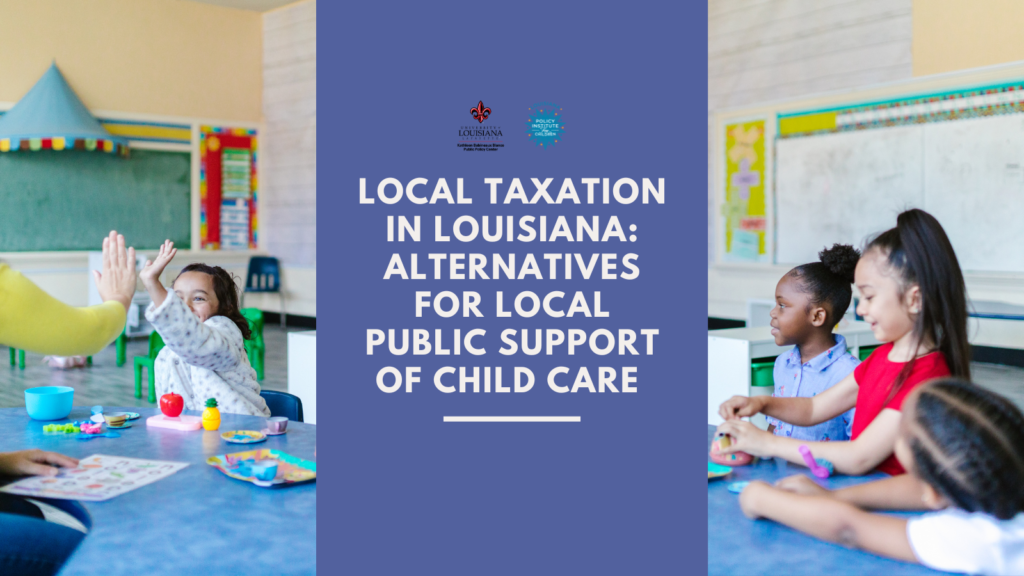Policy Institute and Blanco Center Release Report to Inform Local Governments of Various Strategies to Help Finance Child Care

NEW ORLEANS (November 17, 2022) — The Louisiana Policy Institute for Children (LPIC) in partnership with the Kathleen Babineaux Blanco Public Policy Center and B.I. Moody, III College of Business at the University of Louisiana Lafayette today released the report “Local Taxation in Louisiana: Alternatives for Local Public Support of Child Care”. This report provides an overview of local taxation options in Louisiana, focusing on the legal framework for generating new sources of revenue for early care and education and the capacity for parishes and municipalities to levy additional taxes at the local level.
“Local governments in Louisiana looking for new sources of funding to support child care can use this resource to explore alternatives and identify a solution that best fits the local needs,” said Stephen Barnes, Ph.D., Director of the Kathleen Babineaux Blanco Public Policy Center. “We encourage local leaders to use the report as a resource as a starting point to consider the local tax base, administrative capacity, how a tax could impact residents, and different methods for creating and structuring tax districts.”
Even with recent increases in state funding for early care and education, the need for expanded access to quality child care is prevalent throughout the state. Local governments can provide additional sources of revenue to supplement what is already available from state and federal sources, helping to close the access gap for the many unserved Louisiana working families.
“Local municipalities have an opportunity to leverage state matching funds through the Louisiana Early Childhood Education Fund to expand access to quality early care and education for the children who need it most in their communities. The fund offers a dollar-for-dollar match for these investments, and right now there is over $48 million available for these municipalities to draw down from,” said Libbie Sonnier, Ph.D., executive director of the Louisiana Policy Institute for Children.
One example of a local tax initiative for early care and education is the property tax measure recently approved by voters in Orleans Parish. The property tax measure, also known as a millage, will create 1,000 or more early childhood seats for low-income children annually for the next 20 years. These funds will also expand the supply of quality early learning centers and fund child and family support services and coaching and professional development for teachers. This successful voter supported referendum is a prime example of one strategy highlighted in the report.
To view this report in its entirety, please visit the Blanco Public Policy Center and to submit any inquiries, contact Stephen Barnes, Ph.D. at barnes@louisiana.edu.
###
About the Louisiana Policy Institute for Children
Louisiana Policy Institute for Children is a 501(c)(3) nonpartisan, nonprofit organization dedicated to ensuring that Louisiana’s young children, from birth to age four, are best prepared for success in school and in life. The Policy Institute develops policy proposals informed by data, research, best practices, and the experiences of other states to improve the outcomes of Louisiana’s youngest citizens, and further provides educational and outreach activities based on recommended policy solutions. The organization works to ensure children are safe, healthy and have the opportunity to reach their full potential. For more information, visit www.policyinstitutela.org and follow the Louisiana Policy Institute for Children on Facebook, Twitter and Instagram.
About Blanco Public Policy Center
A partnership between the College of Liberal Arts and the Edith Garland Dupré Library, the Kathleen Babineaux Blanco Public Policy Center focuses on the public policy areas championed by Governor Blanco during her 25-year career in state government. These issues included education, poverty and economic opportunity, criminal justice reform, health and healthcare, the coast and environment, and governmental ethics.
The Blanco Center aims to provide policymakers and the public with the information necessary to improve lives and communities across Louisiana. With this in mind, a special interest of the center is promoting and expanding the role of women in politics and providing training for community leaders and elected officials.